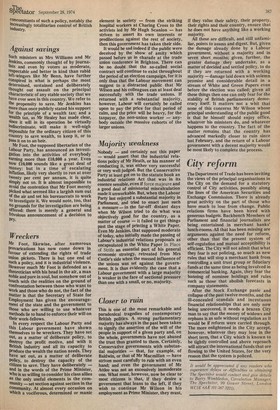Majority weakness
Nobody — and certainly not this paper — would assert that the industrial relations policy of Mr Heath, or his manner of conducting it, was either very successful or very well judged. But the Conservative Party at least got on to the statute book an industrial relations Act that was in its essence sensible, even if force majeure and a good deal of ministerial miscalculation made it unworkable. But, when the Labour Party last enjoyed a substantial majority in Parliament, and tried to enact just such a measure — in the far-off distant days when Mr Wilson tried to do what was objectively good for the country, as a matter of course — it failed to get things past the stage of printing a White Paper. Even Mr Jenkins, that supposed moderate of today, who initially made the passing of Labour's industrial relations proposals as encapsulated in the White Paper In Place of Strife an essential part of his general economic strategy, retreated from Mrs Castle's side when the massed influence of the unions was set against the government. It is thus evidently the case that a Labour government with a large majority is weaker in the face of sectional pressure than one with a small, or no, majority.


































 Previous page
Previous page